James Frey: Five Years Later, Part 1
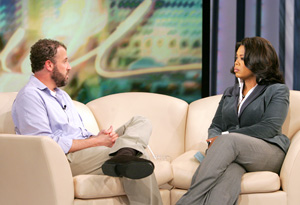
Photo: George Burns/Harpo Studios
Five years after the controversy and media firestorm over his memoir, A Million Little Pieces, author James Frey returns to share his side of the story.
On January 26, 2006, James Frey left the Oprah Show studio in a town car and drove to the airport. He had just finished taping an appearance where Oprah confronted him about the fictionalized accounts he included in his best-selling memoir, A Million Little Pieces—and he says he was in shock about what had just transpired onstage.Five years later, as James sits down with Oprah once again, he remembers that afternoon. "I wasn't sure what I was feeling. I was definitely stunned," he says. "And I just wanted to get home."
A few hours later, James arrived in New York City, where the aftershock of the show was already evident. "I was standing in the cab line [at LaGuardia Airport], and people were staring at me, taking pictures of me with their cell phones, and whispering and pointing," he says.
As James' cab drove across the Williamsburg Bridge toward his apartment, he says that a strange feeling came over him. "I was just sitting in the cab, staring out the window, and I just started laughing," he says. "I don't really know why I laughed, but I laughed pretty hard. ... I think the cab driver probably thought I was crazy. He had some hysterical lunatic laughing in the back of his car for no reason."
Once he arrived home, James says his wife hugged him and told him that she loved him. Then, he kissed his sleeping daughter and ended the difficult day.
To this day, James says that he's never watched that infamous episode of The Oprah Show from 2006. "I think of it as sort of a personal car crash for me," he says. "I just don't want to watch it. It was definitely not my finest day."
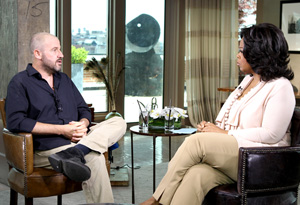
Photo: George Burns/Harpo Studios
From the moment the controversy began to today, James says he never shed a tear over the ordeal. And even now, he says it is hard to find words to describe his emotions as the aftermath of the scandal unfolded.
Oprah: Were you free, were you frustrated, were you angry with me? Did you think you'd been set up?
James: I mostly thought to myself, "How did I arrive at this place? How did I get here?" This is not what I ever set out to do. This is not who I wanted to be. This is not what I worked a lot of years for. I think, at times, yeah, there was anger. There was confusion. There was embarrassment. There was sadness. A lot of times, the most profound feelings we have, I don't think we have words for.
Oprah: Yes, it's difficult to articulate it, particularly when you're in it.
James: There were all those things. It was really like a moment-to-moment thing. It was just, "Get through this. Get through this. Get through this. It'll be fine. You'll be fine. Get through it." I was feeling a lot of things. It was a pretty overwhelming experience.
Oprah: Were you free, were you frustrated, were you angry with me? Did you think you'd been set up?
James: I mostly thought to myself, "How did I arrive at this place? How did I get here?" This is not what I ever set out to do. This is not who I wanted to be. This is not what I worked a lot of years for. I think, at times, yeah, there was anger. There was confusion. There was embarrassment. There was sadness. A lot of times, the most profound feelings we have, I don't think we have words for.
Oprah: Yes, it's difficult to articulate it, particularly when you're in it.
James: There were all those things. It was really like a moment-to-moment thing. It was just, "Get through this. Get through this. Get through this. It'll be fine. You'll be fine. Get through it." I was feeling a lot of things. It was a pretty overwhelming experience.
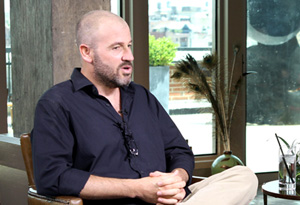
Photo: George Burns/Harpo Studios
Before his second appearance on The Oprah Show in 2006, a media firestorm had erupted over the fictionalization that appeared in James' memoir—including a report from The Smoking Gun called "The Man Who Conned Oprah." So, when James agreed to appear on the show to address the controversy surrounding A Million Little Pieces, Oprah says she was surprised.
"When I look at the tape five years later with a different perspective, I wonder what was said to you that would make you say yes," Oprah says to James.
James says that he was not aware that the entire show would be about him and his book. "I was told the show was going to be called 'Truth in America' and that it was going to be a discussion about the flexible definition of truth, or if there is a flexible definition of truth," James says. "I was told it would be a sort of mannered discussion, I guess, or a reasonable discussion, and that I would have a chance to tell my side of it."
The moment James says he realized the show could take a different turn was just before he left his hotel to go to Harpo Studios. "We were going to wait for a car, and [journalists] Frank Rich and Richard Cohen were there," he says. "I got introduced to them, and I was like, 'What are you guys here for?' And one of them pointed at me and said, 'We're here for you.'"
Watch James talk about what happened when he arrived at the studio in 2006
"When I look at the tape five years later with a different perspective, I wonder what was said to you that would make you say yes," Oprah says to James.
James says that he was not aware that the entire show would be about him and his book. "I was told the show was going to be called 'Truth in America' and that it was going to be a discussion about the flexible definition of truth, or if there is a flexible definition of truth," James says. "I was told it would be a sort of mannered discussion, I guess, or a reasonable discussion, and that I would have a chance to tell my side of it."
The moment James says he realized the show could take a different turn was just before he left his hotel to go to Harpo Studios. "We were going to wait for a car, and [journalists] Frank Rich and Richard Cohen were there," he says. "I got introduced to them, and I was like, 'What are you guys here for?' And one of them pointed at me and said, 'We're here for you.'"
Watch James talk about what happened when he arrived at the studio in 2006
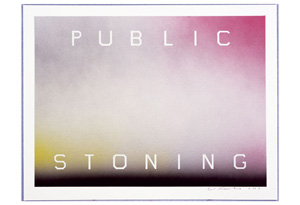
Painting: Ed Ruscha
Even though James says he didn't know everything about that 2006 episode of The Oprah Show, he was aware that he'd be confronted with the discrepancies in his highly publicized memoir. "I did understand that," he says. "But I remember coming out and sitting down and almost immediately feeling steamrolled."
James later commissioned a painting by artist Ed Ruscha to depict what the experience was like for him—it is titled Public Stoning and hangs in James' home today.
Yet, James says the fact that he has this painting doesn't mean he sees himself as a victim. "It reminds me of that experience in a way that keeps me on track now," he says. "That lets me know that I'm never going to let something like that happen again. I'm never going to make decisions that way again. I'm never going to make the same kinds of mistakes again. ... That painting, to me, isn't about [being] a victim of public stoning, because I don't think I am. I think whatever happened on that show and whatever happened because of A Million Little Pieces happened because of me. Because I made some bad choices."
James later commissioned a painting by artist Ed Ruscha to depict what the experience was like for him—it is titled Public Stoning and hangs in James' home today.
Yet, James says the fact that he has this painting doesn't mean he sees himself as a victim. "It reminds me of that experience in a way that keeps me on track now," he says. "That lets me know that I'm never going to let something like that happen again. I'm never going to make decisions that way again. I'm never going to make the same kinds of mistakes again. ... That painting, to me, isn't about [being] a victim of public stoning, because I don't think I am. I think whatever happened on that show and whatever happened because of A Million Little Pieces happened because of me. Because I made some bad choices."
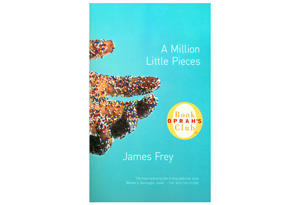
Over the past five years, James has had time to reflect on one question he asked himself the day of that fateful Oprah Show interview: How did he get here? "I wrote a book, and I published it as something that it wasn't, and I was dishonest in promoting the book," he says. "That's how I got there."
Why publish the book as a memoir? James says that this was not his idea at first.
Watch James talk about his original intention for A Million Little Pieces
To understand why James ultimately decided to publish his book as a memoir instead of a novel, he explains how his writing career began two decades ago. "When I was 22, I read a book called Tropic of Cancer, and it actually changed my life. ... I couldn't believe somebody had expressed themselves in that way and told a story that way, and I couldn't believe somebody made me feel the way that book made me feel," James says. "When I closed that book, I said, 'That's what I'm going to do.'"
From age 22 to 31, James says he taught himself how to write a book. "I didn't go to graduate school. I didn't ever have a writing teacher. I just sat in a room alone for years trying to write a book. Trying to figure out how to write a book. Trying to figure out if I could do it," he says.
After several years, James did indeed write a book and was offered a publishing deal—though he says it wasn't necessarily how he imagined it would be published. "Nobody wanted to publish [A Million Little Pieces] as a novel. At a certain point, I got the opportunity to publish it as a memoir," he says. "It wasn't necessarily how I imagined it, but I wanted it published. I wanted it out in the world, and I said yes."
Why publish the book as a memoir? James says that this was not his idea at first.
Watch James talk about his original intention for A Million Little Pieces
To understand why James ultimately decided to publish his book as a memoir instead of a novel, he explains how his writing career began two decades ago. "When I was 22, I read a book called Tropic of Cancer, and it actually changed my life. ... I couldn't believe somebody had expressed themselves in that way and told a story that way, and I couldn't believe somebody made me feel the way that book made me feel," James says. "When I closed that book, I said, 'That's what I'm going to do.'"
From age 22 to 31, James says he taught himself how to write a book. "I didn't go to graduate school. I didn't ever have a writing teacher. I just sat in a room alone for years trying to write a book. Trying to figure out how to write a book. Trying to figure out if I could do it," he says.
After several years, James did indeed write a book and was offered a publishing deal—though he says it wasn't necessarily how he imagined it would be published. "Nobody wanted to publish [A Million Little Pieces] as a novel. At a certain point, I got the opportunity to publish it as a memoir," he says. "It wasn't necessarily how I imagined it, but I wanted it published. I wanted it out in the world, and I said yes."
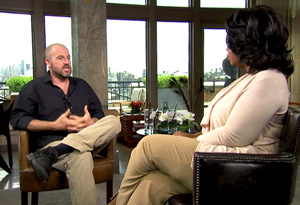
As A Million Little Pieces climbed up the best-seller list, it came across the desk of an Oprah Show producer. The producer introduced the book to Oprah, and after reading it, Oprah chose it as a selection for Oprah's Book Club. Oprah says she called James herself to share the news, and it's a phone call James remembers well.
"I thought I was just talking to Sheri [Salata, a supervising producer at the time]," he tells Oprah. "A couple minutes into the phone call, you got on, and you told me you were choosing the book for your book club. I was sort of shocked and thrilled and really, really excited. And I remember hanging up the phone—my wife was downstairs with one of her friends, and they were at the kitchen table—and I walked downstairs. They said, 'How'd the call go?' And I said, 'Our life just changed.' I don't think I knew when I said that..."
"How prophetic that was," Oprah says.
"How prophetic that was," James says.
"I thought I was just talking to Sheri [Salata, a supervising producer at the time]," he tells Oprah. "A couple minutes into the phone call, you got on, and you told me you were choosing the book for your book club. I was sort of shocked and thrilled and really, really excited. And I remember hanging up the phone—my wife was downstairs with one of her friends, and they were at the kitchen table—and I walked downstairs. They said, 'How'd the call go?' And I said, 'Our life just changed.' I don't think I knew when I said that..."
"How prophetic that was," Oprah says.
"How prophetic that was," James says.
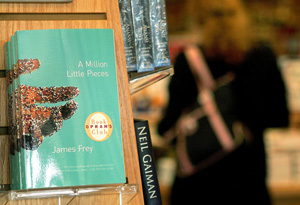
Photo: Tim Boyle/Getty Images
Once A Million Little Pieces was selected for Oprah's Book Club, it topped the best-seller list for 17 straight weeks. As thrilled as he was by the book's success, James knew that its categorization as a memoir could mean trouble, but he says he didn't know how to stop what he had started.
"I think there were opportunities to [stop what I had started], and I think I was scared to do it or didn't know how to do it," he says. "And I didn't do it. It was a mistake. It was a bad mistake."
Watch James talk about his doubts over promoting the book as a memoir
James says he now regrets making the decision to publish the book as a memoir but doesn't blame anyone but himself. "We can swing back to what a memoir is or isn't, what rules there are or aren't, what advice I got or didn't get. But at the end of this, the responsibility for that situation all has to come back to me," he says.
If he could do it all over again, James says he would have done things differently. "I would have been very clear when that book came out about what it was. And I would have been very clear about what I was trying to do when I wrote it," he says.
When James wrote the book, he says he was trying to change the way people think about things, to change lives in some way. "I definitely wasn't trying to write a self-help book," he says. "[But] I was trying to write a book that might help people—addicts or the family members or friends of addicts, that it would give them a different way to think about it."
"And it did," Oprah says. "It has."
"That was very humbling and amazing," James says. "I mean, to this day, I get letters almost every day about A Million Little Pieces. It's probably the greatest thing about what I do."
"I think there were opportunities to [stop what I had started], and I think I was scared to do it or didn't know how to do it," he says. "And I didn't do it. It was a mistake. It was a bad mistake."
Watch James talk about his doubts over promoting the book as a memoir
James says he now regrets making the decision to publish the book as a memoir but doesn't blame anyone but himself. "We can swing back to what a memoir is or isn't, what rules there are or aren't, what advice I got or didn't get. But at the end of this, the responsibility for that situation all has to come back to me," he says.
If he could do it all over again, James says he would have done things differently. "I would have been very clear when that book came out about what it was. And I would have been very clear about what I was trying to do when I wrote it," he says.
When James wrote the book, he says he was trying to change the way people think about things, to change lives in some way. "I definitely wasn't trying to write a self-help book," he says. "[But] I was trying to write a book that might help people—addicts or the family members or friends of addicts, that it would give them a different way to think about it."
"And it did," Oprah says. "It has."
"That was very humbling and amazing," James says. "I mean, to this day, I get letters almost every day about A Million Little Pieces. It's probably the greatest thing about what I do."
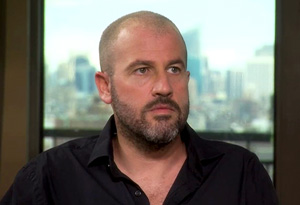
Though James has received some support and positive feedback from readers, he says that the negative attention was overwhelming. "I was able to go places and not feel ostracized, but for [weeks], it was weird and hard," he says. "I would walk out the door and there would be reporters there. There would be cameramen there."
James says he was also sued several times after his memoir was revealed to be both fact and fiction. "On more than one occasion, I was walking down the street and somebody walked up and served me with legal papers," he says.
He continues, "We got sued for damages. ... I got sued for a lot of stuff by a lot of people. I had to hire attorneys, and ultimately, we settled all of it. We gave every reader who had purchased the book, up until that point, the opportunity to get their money back. It was surreal, and I was having a really hard time."
With the public scrutiny and frequent news reports on the memoir controversy, James decided to leave the country and live in France with his wife and daughter. "I love France, and it was great to just push my daughter's stroller down the street and just be some anonymous dad," he says.
James says he was also sued several times after his memoir was revealed to be both fact and fiction. "On more than one occasion, I was walking down the street and somebody walked up and served me with legal papers," he says.
He continues, "We got sued for damages. ... I got sued for a lot of stuff by a lot of people. I had to hire attorneys, and ultimately, we settled all of it. We gave every reader who had purchased the book, up until that point, the opportunity to get their money back. It was surreal, and I was having a really hard time."
With the public scrutiny and frequent news reports on the memoir controversy, James decided to leave the country and live in France with his wife and daughter. "I love France, and it was great to just push my daughter's stroller down the street and just be some anonymous dad," he says.
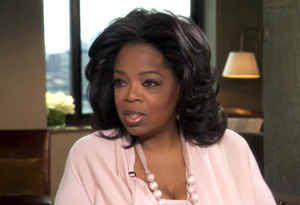
While James was navigating the negativity and aftermath of the controversy, Oprah says she too experienced backlash as a result of the 2006 interview.
Watch Oprah talk about the first phone call she received, condemning how she conducted the interview
At the time, Oprah says, she disagreed with critics who felt that she was too hard on James. "Did you think I was too hard on you?" she asks.
James answers, "I thought it was within your rights to conduct your show however you wanted to. I knew I had made a bad mistake."
"What did you think of the way it was conducted though?" Oprah asks again.
"I thought I got ambushed. Absolutely," James says. "[But] I think, even had I known what I was walking into, I probably still would have walked into it. ... At the end of it, it didn't matter what happened on that show because in some ways, I deserved it. I made a mistake, and at a certain point, it came time to pay for it. And I paid for it."
Part 2 of Oprah's interview with James
Watch Oprah talk about the first phone call she received, condemning how she conducted the interview
At the time, Oprah says, she disagreed with critics who felt that she was too hard on James. "Did you think I was too hard on you?" she asks.
James answers, "I thought it was within your rights to conduct your show however you wanted to. I knew I had made a bad mistake."
"What did you think of the way it was conducted though?" Oprah asks again.
"I thought I got ambushed. Absolutely," James says. "[But] I think, even had I known what I was walking into, I probably still would have walked into it. ... At the end of it, it didn't matter what happened on that show because in some ways, I deserved it. I made a mistake, and at a certain point, it came time to pay for it. And I paid for it."
Part 2 of Oprah's interview with James



